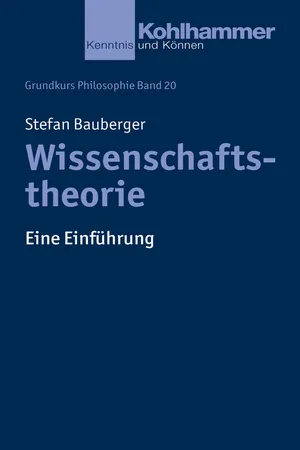
- 191 pages
- English
- ePUB (mobile friendly)
- Available on iOS & Android
About this book
From the two sources of human knowledge (empirical knowledge, logical analysis), Bauberger develops two basic questions of scientific theory, according to which the book is structured: First, scientific theory reflects the methods of the empirical sciences and thus provides assistance for their use. It also assesses the validity of the empirical findings and thus sets itself a genuinely philosophical task. The resulting dialogue of specific scientific fields, methods and meta-reflection shows the relevance of scientific work and calls on the language skills of students outside of their philosophical times. Historical developments and the presentation of scientific philosophical positions from the tradition are discussed in thematic chapters.
Frequently asked questions
- Essential is ideal for learners and professionals who enjoy exploring a wide range of subjects. Access the Essential Library with 800,000+ trusted titles and best-sellers across business, personal growth, and the humanities. Includes unlimited reading time and Standard Read Aloud voice.
- Complete: Perfect for advanced learners and researchers needing full, unrestricted access. Unlock 1.4M+ books across hundreds of subjects, including academic and specialized titles. The Complete Plan also includes advanced features like Premium Read Aloud and Research Assistant.
Please note we cannot support devices running on iOS 13 and Android 7 or earlier. Learn more about using the app.
Information
Table of contents
- Deckblatt
- Titelseite
- Impressum
- Inhalt
- I Einführung
- II Sinnesdaten als Grundlage der Erkenntnis
- III Induktion, Verifikation, Falsifikation
- IV Eigenschaften
- V Theorien
- VI Evolutionäre Erkenntnistheorie
- VII Konstruktivismus
- VIII Erklärung
- IX Theorienholismus, das Analytische und das Apriori
- X Naturgesetze
- XI Objektivierung als Form der Erkenntnis
- Literatur
- Personenverzeichnis
- Stichwortverzeichnis